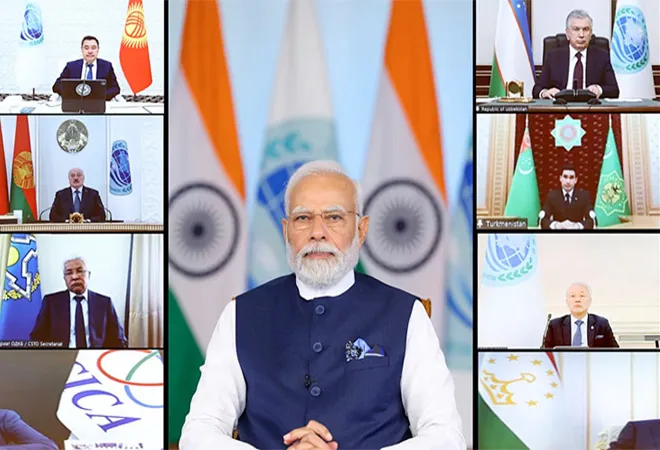-
CENTRES
Progammes & Centres
Location

Taking on Pakistan directly, and the duplicitous attitude of nations like China, he remarked, "Some countries use cross-border terrorism as an instrument of their policies and provide shelter to terrorists.Prime Minister Modi, however, made it a point to highlight two critical issues targeting Pakistan and China. Taking on Pakistan directly, and the duplicitous attitude of nations like China, he remarked, "Some countries use cross-border terrorism as an instrument of their policies and provide shelter to terrorists. SCO should not hesitate to criticise such nations. There should be no place for double standards on such serious matters." With his comments, Modi was making clear that sanctimonious statements from SCO on terrorism have no meaning if Pakistan is not made to feel the heat of regional states. He was underlining New Delhi's wariness about the effectiveness of the SCO on a matter as important as this. Modi also took the battle on territorial sovereignty and connectivity right up to China. Underlining that strong and better connectivity "not only enhances mutual trade but also fosters mutual trust," he however cautioned that "in these efforts, it is essential to uphold the basic principles of the SCO charter, particularly respecting the sovereignty and regional integrity of the member states." In line with its longstanding and consistent approach on China's Belt and Road Initiative (BRI), India refused to sign the paragraph supporting BRI in the New Delhi declaration and stayed out of a joint statement on SCO Economic Development Strategy 2030. This highlights growing challenges for New Delhi as it navigates the inherent fault lines in the SCO. India's bilateral ties with both Pakistan and China preclude any possibility of New Delhi using the SCO as a platform for working together with these nations for the foreseeable future. But more significant, perhaps, is the strikingly anti-west orientation of Russia and China as they try to shape the trajectory of a platform that was initially conceived primarily as an instrument of preventing western encroachment into Central Asia. In his first international outing since last month's mutiny by the Wagner boss, Russian President Vladimir Putin used the SCO platform to underline that "Russia counters all these external sanctions, pressures and provocations and continues to develop as never before." When he thanked the SCO members "who expressed support for the actions of the Russian leadership to protect the constitutional order and the life and security of citizens," he was defiantly reminding the West that he was not isolated as some in the West might think.
Russia and China have found an important partner in Iran in framing a broader coalition against the West.Chinese President Xi Jinping's focus was also on the West and its increasing pushback against Beijing. He urged SCO member states to "uphold international fairness and justice, oppose hegemony and bullying practices, expand the organisation's 'circle of friends', and build a partnership of dialogue rather than confrontation, and strengthening the progressive force for maintaining world peace and stability." Asking SCO members "to make foreign policies independently", he also underscored the need to be "highly vigilant against external attempts to foment a new Cold War or camp-based confrontation in our region". And then there is Iran, which became the newest member of the SCO this year. There has been a lot of discussion about an emerging Russia-China-Iran "axis" in the West. Russia and China have found an important partner in Iran in framing a broader coalition against the West. For India, the SCO is important to engage its extended neighbourhood in Central Asia more productively. But if it continues to evolve into an anti-West platform, New Delhi's dilemmas pertaining to both its bilateral divergences with China and Pakistan as well as wider strategic divergence with the broader trajectory of the SCO itself would become even sharper. Four Central Asian countries, which formed the SCO in 2001 with China and Russia, will also have their own challenges with this evolving trajectory of the SCO. For India, Central Asia is a critical geography where its engagement is evolving. If the present trends within the SCO continue, New Delhi will have to invest far greater diplomatic energy in bilaterally engaging its Central Asian neighbours. Old hopes from the SCO seem to be fast falling by the wayside.
The views expressed above belong to the author(s). ORF research and analyses now available on Telegram! Click here to access our curated content — blogs, longforms and interviews.

Professor Harsh V. Pant is Vice President – Studies and Foreign Policy at Observer Research Foundation, New Delhi. He is a Professor of International Relations ...
Read More +